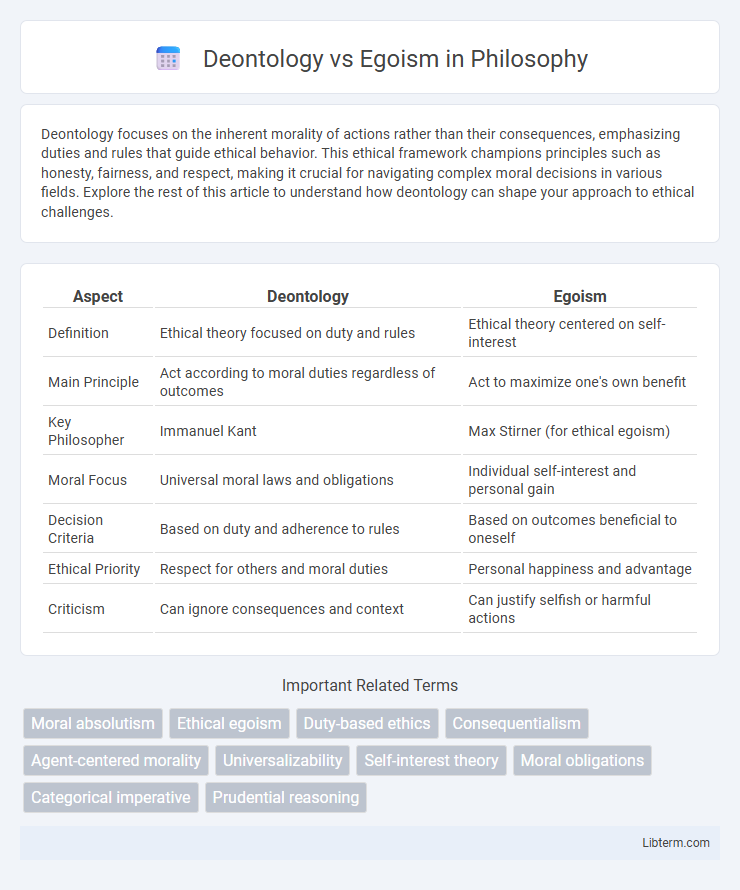Deontology focuses on the inherent morality of actions rather than their consequences, emphasizing duties and rules that guide ethical behavior. This ethical framework champions principles such as honesty, fairness, and respect, making it crucial for navigating complex moral decisions in various fields. Explore the rest of this article to understand how deontology can shape your approach to ethical challenges.
Table of Comparison
| Aspect | Deontology | Egoism |
|---|---|---|
| Definition | Ethical theory focused on duty and rules | Ethical theory centered on self-interest |
| Main Principle | Act according to moral duties regardless of outcomes | Act to maximize one's own benefit |
| Key Philosopher | Immanuel Kant | Max Stirner (for ethical egoism) |
| Moral Focus | Universal moral laws and obligations | Individual self-interest and personal gain |
| Decision Criteria | Based on duty and adherence to rules | Based on outcomes beneficial to oneself |
| Ethical Priority | Respect for others and moral duties | Personal happiness and advantage |
| Criticism | Can ignore consequences and context | Can justify selfish or harmful actions |
Introduction to Deontology and Egoism
Deontology is an ethical theory that emphasizes duty, rules, and the inherent morality of actions regardless of outcomes, rooted in the works of Immanuel Kant. Egoism, in contrast, prioritizes self-interest as the foundation for moral decision-making, asserting that actions are morally right if they promote one's own well-being. Both frameworks provide contrasting approaches to ethics, with deontology focusing on universal moral principles and egoism centering on individual benefits.
Core Principles of Deontology
Deontology centers on adherence to moral duties and rules, emphasizing actions guided by universal maxims rather than outcomes. Immanuel Kant's categorical imperative exemplifies this framework, mandating that individuals act only according to principles that can be consistently willed as universal laws. Unlike egoism, which prioritizes self-interest, deontology upholds the intrinsic rightness or wrongness of actions based on their conformity to ethical duties.
Fundamental Tenets of Egoism
Egoism fundamentally asserts that individuals should act in their own self-interest, prioritizing personal benefits above all else. This ethical theory emphasizes that moral actions are those that maximize one's own welfare, often linked to psychological egoism, which states people naturally act to fulfill their own desires. Unlike deontology, which rests on duty and universal moral rules, egoism rejects external moral constraints in favor of subjective self-advancement and pragmatic decision-making.
Key Differences Between Deontology and Egoism
Deontology centers on following universal moral rules and duties regardless of outcomes, while egoism prioritizes actions that maximize self-interest and personal gain. Unlike egoism's outcome-based ethics, deontology emphasizes intrinsic rightness or wrongness of actions independent of consequences. Key distinctions include deontology's commitment to impartial moral principles versus egoism's focus on subjective self-benefit as the primary ethical guide.
Moral Obligation: Duty vs. Self-Interest
Deontology emphasizes moral obligation as adherence to universal duties and principles regardless of personal gain, prioritizing ethical actions based on inherent rightness. Egoism frames moral obligation through the lens of self-interest, asserting that individuals should act to maximize their own well-being and happiness. The tension between duty-driven ethics and self-centered motives underpins debates on moral responsibility and ethical decision-making.
Prominent Philosophers and Historical Background
Immanuel Kant is the central figure in deontology, emphasizing duty-based ethics and the categorical imperative, which guides moral actions irrespective of outcomes. In contrast, egoism is linked to philosophers like Thomas Hobbes and Ayn Rand, who argue that self-interest drives human behavior and ethical decisions. Historically, deontology emerged during the Enlightenment as a response to consequentialist theories, while egoism draws from early social contract theory and rational self-interest principles.
Practical Applications in Ethical Decision-Making
Deontology emphasizes adherence to moral duties and rules, guiding individuals to act based on principles regardless of outcomes, which is crucial in professions like law and medicine where consistent ethical standards are required. Egoism, prioritizing self-interest, influences decision-making by encouraging actions that maximize personal benefits, often applied in business strategies and negotiations to enhance individual success. Practical application in ethical decision-making involves balancing deontological duties with egoistic interests to achieve morally sound yet personally advantageous outcomes.
Strengths and Criticisms of Deontological Ethics
Deontological ethics prioritizes duty and moral rules, ensuring consistent and universal principles such as Kant's categorical imperative guide ethical decision-making, which strengthens moral clarity and accountability. Critics argue that strict adherence to rules can lead to inflexible outcomes, neglecting context and consequences crucial in complex situations. The rigidity of deontology sometimes conflicts with practical morality, especially when duties clash and no clear resolution exists.
Advantages and Limitations of Egoism
Egoism emphasizes individual self-interest as the basis for ethical decision-making, promoting personal responsibility and motivation to achieve one's goals, which can lead to innovation and self-improvement. However, its limitation lies in potential conflicts between individual and collective interests, risking selfish behavior that may undermine social cooperation and moral duties. This ethical framework often struggles to address broader societal welfare and can result in ethical dilemmas when personal gain contradicts communal well-being.
Contemporary Relevance and Real-World Implications
Deontology emphasizes adherence to moral duties and rules, influencing contemporary ethical frameworks in law and professional conduct by prioritizing justice and rights over outcomes. Egoism, centered on self-interest as the foundation of morality, shapes modern business practices and political strategies where individual or organizational benefits drive decision-making. The real-world implications involve balancing collective responsibilities with personal gains, critical in debates on corporate ethics and public policy.
Deontology Infographic

 libterm.com
libterm.com